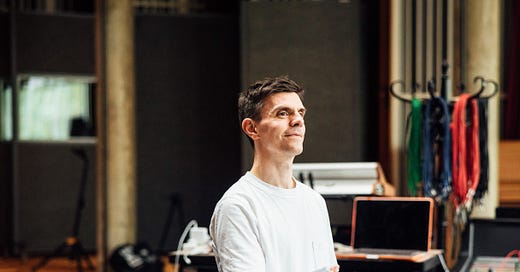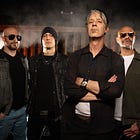CR 047: Composer Alexander Parsons Melds Music and Technology to Bring Nonfiction Stories to Life
The sought-after composer of “Tucci in Italy” discusses his adventurous approach to making music.
Alexander Parsons is a London-based composer whose work has been featured in a number of high-profile documentaries, including the BBC’s critically-acclaimed Stephen: The Murder that Changed a Nation, the BAFTA Award-nominated Hell Jumper, the harrowing Flight 149: Hostage of War, which premiered at this year’s SXSW, and most recently, Stanley Tucci’s National Geographic series, Tucci in Italy. Still, he admits that although he knew from a young age that he wanted to pursue a career in music, for many years he wasn’t quite sure what that career would look like. “I loved playing the violin,” he says. “I was in bands. But [I had] no idea how that would lead to a career.”
While a student at Goldsmiths, University of London, he was introduced to composition, and a newfound passion took hold. “It was quite interesting,” he says. “They put you in a room with a computer [to] see what you can make. And it was that freedom that led me to think, ‘There’s something that I could do with this.’ As my final project, I was given the opportunity to score a film, and I just loved it. I was using weird sounds that I found interesting. I put them up against this film, and that physical positioning of something against something else and that connection of music and sound and image that then stayed there—once it’s finished, it’s like, ‘Oh, I’ve got a thing.’ I thought, ‘I’d love to do this.’ I eventually found out that you can do it.”
Not one to be pigeonholed, Parsons is always looking for new ways to integrate technology into his work. He performed the violins on Ristband’s award-winning immersive concert experience, Future x Music Event, which was held at SXSW in March, and is currently working on a multi-sensory installation called From the Fields. He was also a founding member of Miro Shot, a collective of multidisciplinary artists that blended virtual reality with live music. “I’ve always thought technology is at the heart of what we do,” he says. “I work in music and music creation, and I have lots of instruments in my studio which are acoustic and electronic. And technology is at the heart of how we record things. Looking forward to the future, it’s inevitable that technology will play a bigger and bigger part every day in what we do. And I really embrace that.”
I recently chatted with Parsons about his thoughts on AI, how he breaks through creative blocks, and his love for history.
SANDRA EBEJER: There are photos of you on Instagram playing violin at a very young age. When did you begin playing music? Did you grow up in a musical household?
ALEXANDER PARSONS: No, I didn’t at all, actually. Neither of my parents were musicians. They were both geography teachers. So no links to music whatsoever. I was given the opportunity to learn violin. I was sent to this very small—I guess you could call it a violin school, but it was really just my teacher’s living room. I’d have private lessons, but then every Saturday a group of us would play together in the same room, with the older students as well. So we had this really lovely experience of playing with both young and older musicians. We’d get to hear these brilliant violinists and learn from them. And then as we got older, we became the older musicians, and the younger ones would join. It was a lovely musical experience. So it wasn’t anything that was in my household, but both my parents loved music and still do.
I know from being a parent that even if your child expresses some interest in playing a musical instrument, actually getting them to stick with it is an entirely different situation. Were you someone who, as a child, was willing to practice?
It’s so easy to imagine this rose-tinted childhood where it’s very musical and everyone loves it. But there were definitely moments when I didn’t want to play. But I think, generally, there was so much fondness. I was given so much encouragement at school. I was never focused on some of the more [non-musical subjects], like geography, which both of my parents obviously focused on. I was never really into those. And sometimes, I will admit, I didn’t go to those lessons. But I would go down to the practice rooms and have a little play on the piano, and the teachers knew that. At times, they stepped in, but there were other times where they understood that a great thing to do would be to let me just play and learn my own way. Thinking back, I have such great memories of that. And I can thank my teachers so much for it.
You’ve composed scores for many projects, particularly documentaries, some of which are about pretty heavy topics. How do you approach your work when scoring a project? Is there much research involved in the subject matter in order to achieve a certain sound?
It changes every time. Often when I come to a project, I know very little about it, and that can be quite daunting sometimes. There was a recent project called Flight 149 about an airplane that landed in Kuwait on the day that Saddam Hussein invaded, and all 400 people on the plane were taken hostage. I remember when the director, Jenny [Ash], was talking to me about this—and it’s not a subject I knew anything about at all—she was saying, “I want to tell the story about what’s inside these hostages’ heads.” So for me, rather than dig deep into the history, which I gradually learned as the story was being edited, I was just given this brilliant opportunity to experiment with sounds and get into that world.
Do you prefer to work on certain types of projects over others?
I love working on films about people. I think when you grow up in a city, you’re surrounded by so many different types of people, and everyone’s got their own different story and their own thing to say, and sometimes they’re so surprising. Having grown up in that sort of area, I’m really drawn to that. Whether it’s fiction or documentary, when someone is telling their story, it fascinates me. And as you mentioned earlier, sometimes they can be quite dark and challenging stories. As a composer, it’s my job to find a way of expressing that story in an appropriate way.
You’ve incorporated technology into your work for quite some time. You recently participated in an event at SXSW that combined live music, AI-generated music, virtual reality, and 3D artwork. AI is obviously a hot button topic these days, especially in creative fields. How do you feel about the use of AI in making music?
It’s a very complex one for composers. What I embrace is how we can use AI and technology to enhance what we do and certainly not replace it. That’s the most important thing for me—how we can use technology to make things more fascinating, both for ourselves as composers, but also for the listener.
There’s a company called Ristband, and they have developed this incredible virtual reality live concert experience. All of the audience are in VR headsets and they’re experiencing a live concert. They see the performer perform and they will at some points be taken into a different world. That, for me, is a brilliant way that technology can enhance what we’re doing and heighten the experience, and I’m really excited by that.
You’re also working on a multi-sensory project called From the Fields. What can you share about that?
The whole idea stems from my love for history and love for London. Something that I find fascinating is you experience a city changing over and over again and each time something changes, the old thing is replaced or removed. It’s that hidden element that I’m fascinated by. From the Fields is a multi-sensory installation, but it’s about a very specific area of London, which is sandwiched between Soho and Covent Garden. It’s quite a small area, but it’s got this really rich and actually quite dark history that dates back to the 12th century. Originally it was set up as a leper hospital one mile away from the city to house people with leprosy. It was a rural area at the time. By the time we hit the 17th century, it started to really develop. As it became more and more populated, it descended into poverty and became one of the poorest and most crime-ridden parts of London. And now, strangely enough, it’s one of the most vibrant. It’s where Google’s headquarters is. You’ve got “Tin Pan Alley,” which is Denmark Street, which has got such a big music history with Sex Pistols, The Beatles. David Bowie and the Rolling Stones all recorded there. So it’s this amazing history, but all of that previous history has been hidden. And what From the Fields is doing is creating a reawakening of that history with music, with sound and with images, documentary and spatial audio, with a company that I’ve been working with called D&B who have this lab inside the Science Museum. I’ve been working with them to see how they can use their technology to really heighten this historical experience.
That’s very cool. When will it be available for people to engage with?
We’re in early stages at the moment. We have a venue, which is right in the heart of this area called St Giles, and we’ll be there for a week and a half. It will be towards the end of this year. But there will be little things that we launch throughout the period that will start to get people thinking about the area. For us, the idea of reawakening a space is a brilliant thing, and a really fascinating thing to do.
Who are your influences, musical or otherwise? Who do you turn to when you need inspiration?
When I was at university, I was absolutely fascinated by John Cage and his work. He’s someone that I come back to an awful lot. He wrote a piece called 4’33”, which is a silent piece of music. What fascinates me about it is it’s not the sound of the silence, it’s what fills the space. He said something really fascinating: “There’s no such thing as an empty space or an empty time,” and that is very much at the heart of From the Fields. There’s always something that comes before something else. So, yeah, John Cage—he’s most definitely someone whose ideas I’ve really focused on. I’ve had many musical inspirations. I’m a big fan of what Jonny Greenwood composes. His film scores and the versatility within his music I really love. Many things about his work inspire me.
What advice would you have for musicians out there who are interested in following in your footsteps?
Don’t be afraid to show some vulnerability. Don’t be afraid to ask questions. I’m quite a curious person, but for a long time, I was shy about being curious. Sometimes you don’t necessarily want to come across as someone who doesn’t know about something. Actually, it’s awesome to not know about something. If you’re unsure about something, ask questions about it. From asking questions myself, I learn about things I didn’t know before, whether it’s a piece of technology I didn’t know about or something about a story, or even just something related to my work, which I should probably know but don’t. Ask that question. It’s brilliant to be more curious about things.
To learn more about Alexander, find him on Instagram.
This interview has been edited for clarity and length.
You might also enjoy…








